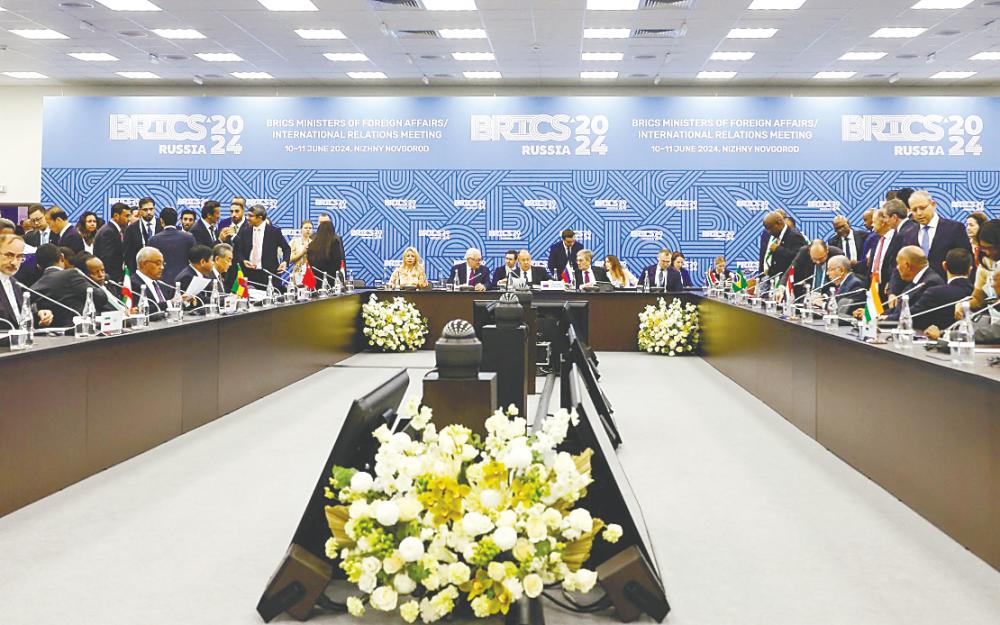OBSERVERS following the progress of BRICS – a rival economic, political and developmental grouping to the Western-dominated International Monetary Fund, World Bank, G7 and G20 – will be wondering why there has been little coverage of the event taking place in Kazan from Oct 22 to 24.
This may be because the 16th summit meeting is being chaired by Russia under the leadership of President Vladimir Putin, which the West has identified as the biggest threat to world peace and security. Hence, the unwillingness of the Western media to provide coverage that may provide positive attention to Putin and Russia.
Another factor is that the Western media are shareholders and cheerleaders of the present world order based on US dominance – some see it as hegemony – with support from its diminishing coterie of allies.
CNN, BBC, New York Times, Nikkei Asia, The Economist and Bloomberg want their readers to see the grouping as irrelevant and an insignificant player in global politics and economics. Hence, the dismissive reportage or silence from Western media channels on BRICS. This can be expected to continue with the reporting on the coming summit.
De-dollarisation: Slow motion or quicker crash
During the summit, the subject
of de-dollarisation will be
widely discussed. A longstanding concern of BRICS member countries is the dominance of the US dollar, which has resulted in the exposure of developing countries to dollar fluctuation with negative impact on
their trade, economies and development.
This legacy from the aftermath of World War II and the ascendancy of the US as a global superpower is now being contested in part as a result of the unprecedented US-led sanctions against Moscow that have forced Russia and other countries trading with it to explore ways to pursue trade and international payments without resorting to use of the dollar.
For now, we are seeing a difference of opinion possibly emerging on this issue with two leading BRICS members – India and Russia – having contrasting positions.
According to a news report given attention by Western and Indian media, India’s External Affairs Minister S. Jaishankar on Oct 1 noted that US policies often complicate trade with certain countries and that India was seeking “workarounds” without intending to move away from using the dollar, unlike some other nations.
“We have never actively targeted the dollar. That is not part of our economic, political or strategic policy. Some others may have
done so.”
At the same time, Jaishankar noted that a multipolar world
will eventually be reflected in “currencies and economic dealings”.
In contrast to India’s pro-dollar signalling, a stronger position was expressed by Russian Finance Minister Anton Siluanov. Apparently in response to India’s stand, on Oct 11, he argued on the urgent need for BRICS to create
its own international payments system.
According to him, platforms that operate using Western infrastructure are becoming “increasingly politicised”. He called for a new cross-border payment infrastructure to be based on national currencies and new technologies to enable faster and cheaper foreign trade transactions that are free from external interference.
“Our task is to create our own independent system, given the... largely political decisions of the West.” Referring to the work undertaken by BRICS finance ministries and central banks, he stated that “BRICS... is beyond politics, beyond any pressures and restrictions. Its aim is to stimulate economic growth and boost the income of our citizens.”
What may finally emerge from the de-dollarisation process undertaken by BRICS is not simply a rival payment mechanism. It is one that will have ripple effects on international finance, monetary policies, global supply chains and oil trading in which BRICS member countries, already accounting for over 40% of production, would potentially control over 50% of global petroleum production.
The overall impact will inevitably lead to changes in global economic power. It is not surprising that the present political and financial institutions and dominant countries want to see BRICS fail.
Meanwhile, another key indicator of the changing geopolitical balance of power is BRICS’s membership count which has burgeoned during the past two years.
According to executive director of Africa-China Policy and Advocacy Paul Frimpong, “BRICS alliance attracts a diverse group of potential members because of its primary-driven shared desire to create a more level global landscape that many countries believe is currently biased against them”. (https://watcher.guru/news/47-countries-ready-to-join-the-brics-alliance #google_vignette)
Among countries identified as officially applying or expressing their intention to join BRICS in the coming summit are Azerbaijan, Algeria, Vietnam, Indonesia, Pakistan, Nigeria, Venezuela, Kazakhstan, Palestine, DR Congo, Gabon, Bangladesh, Bahrain, Kuwait, Senegal and Bolivia.
Unofficial counts have placed the number of countries that have applied for membership at 26 with another 22 that have expressed interest in joining.
Prominent among potential members are Turkey, a Nato (North Atlantic Treaty Organisation) member since 1952; Thailand, a longtime US ally; Serbia, an aspiring and still awaiting European Union candidate that now sees BRICS as a better alternative to Brussels; Cuba, likely to become the first North American country to join; and Malaysia, whose intention to apply was recently confirmed by Prime Minister Datuk Seri Anwar Ibrahim.
A few progressive Western think-tanks monitoring global economics and politics have advised the US and Western allies to avoid alarm and confrontation with the latest BRICS developments and to address the legitimate complaints of BRICS member countries.
However, these views are of a small minority. What we can expect is for opponents of BRICS to look for openings to exploit its frailties as well as to undermine it through all possible means, including through covert and underhand strategies and activities.
Lim Teck Ghee’s Another Take is aimed at demystifying social orthodoxy.
Comments: letters@thesundaily.com









